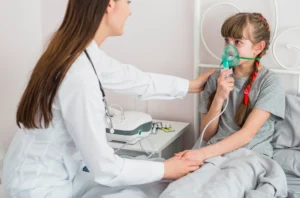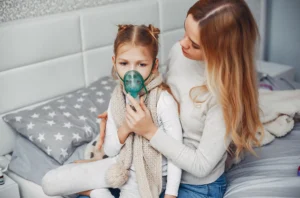Asthma Evaluation And Treatment
Asthma is a chronic respiratory condition characterized by inflammation and narrowing of the airways, leading to difficulty in breathing. Common symptoms include wheezing, coughing, shortness of breath, and chest tightness, which can vary in intensity and frequency. Asthma can be triggered by various factors, including allergens, environmental pollutants, respiratory infections, and physical activity. Proper management and treatment are essential for controlling symptoms and improving the quality of life for those affected, allowing individuals to lead active and healthy lives.

Key Symptoms and Triggers of Asthma
Key Symptoms:
- Wheezing: A high-pitched whistling sound when breathing, especially during exhalation.
- Coughing: Frequent coughing, particularly at night or during physical activity.
- Shortness of Breath: Difficulty in breathing or a feeling of tightness in the chest.
- Chest Tightness: A sensation of pressure or constriction in the chest area.
- Fatigue: Increased tiredness due to difficulty breathing or lack of sleep from nighttime symptoms.
Common Triggers:
- Allergens: Pollen, dust mites, mold, pet dander, and certain foods can provoke asthma symptoms.
- Environmental Factors: Air pollution, smoke, and strong odors can irritate the airways.
- Respiratory Infections: Colds, flu, and other infections can worsen asthma symptoms.
- Weather Changes: Cold air, humidity, and sudden temperature changes may trigger attacks.
- Physical Activity: Exercise, especially in cold or dry air, can lead to exercise-induced bronchoconstriction.
Customized Treatment Plans for Pediatric Asthma

- Thorough Initial Assessment: In-depth evaluation of the child’s medical history, symptom patterns, and specific triggers to inform the treatment strategy.
- Personalized Medication Regimen: Development of a tailored plan that includes both long-term control medications and rescue inhalers, ensuring optimal management of asthma symptoms.
- Targeted Lifestyle Modifications: Recommendations for avoiding environmental triggers and adopting healthy habits to enhance respiratory health and overall well-being.
- Regular Monitoring and Adjustment: Ongoing assessments to track progress, adjust medications, and refine management strategies based on the child’s response to treatment.
- Comprehensive Emergency Action Plan: Detailed instructions for parents and caregivers on recognizing symptoms, responding to asthma attacks, and knowing when to seek medical assistance.
Choosing Fayrouz Pediatric Clinic for asthma care ensures that your child receives specialized attention tailored to their unique needs. Our dedicated team focuses on comprehensive evaluations to develop personalized treatment plans that effectively manage asthma symptoms. We prioritize your child’s comfort and well-being, providing ongoing support and regular monitoring to optimize their health.
Book an Appointment
Frequently Asked Questions
If you have any further questions or need additional information, please don’t hesitate to reach out. Best regards, Fayrouz.